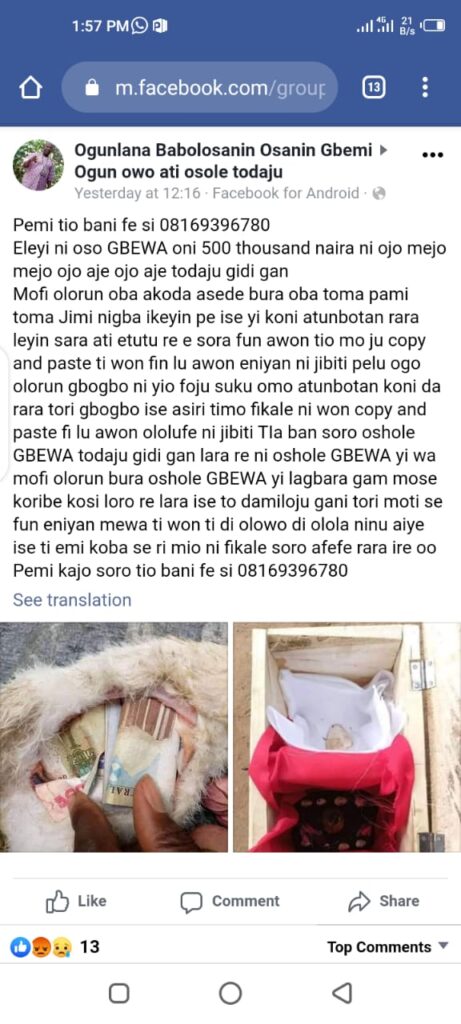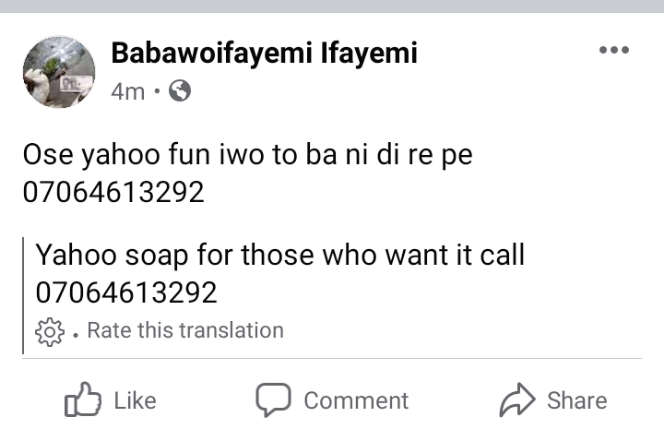BY SAMAD UTHMAN AND JAMES OJO
Many Nigerians were dumbfounded on January 29, 2022, when Majekodunmi Balogun, a 20-year-old, confessed that he killed Sofiat Kehinde, an 18-year-old girl, for money ritual.
Balogun was arrested and grilled alongside three other suspect-teenagers: Wariz Oladeinde (17), Lukman Gafar (19), and Soliu Majekodunmi (18) — the boyfriend of the deceased.
During interrogation at the Ogun state police command headquarters, Balogun said they got tips on money ritual from a Facebook group.
Advertisement
He said he typed ‘how to make money ritual’ on Facebook, and the result of his search instructed him to behead and burn a female skull in a local pot.
“I screenshot the steps for doing money rituals on Facebook. I saw the steps on a Facebook page. They usually post the steps in the group. I don’t know who created the group,” he had said.
The development had elicited varied reactions and heated debates on social media platforms about the brash quest for money by the youths.
Advertisement
THE QUEST FOR QUICK WEALTH
Cybercrime, popularly called ‘yahoo yahoo’, is a common phenomenon among youths in Nigeria — adjudged to be the poverty capital of the world.
‘Yahoo boys’, as they are called, rely on their computer dexterity to victimise unsuspecting persons in cyberspace. In some cases, they go a step further to indulge in ‘yahoo plus’ — another dimension of cybercrime that involves using traditional charms and mystical powers to swindle victims.
While the practice is strongly condemned by religious groups and several stakeholders, it has been a major societal ill in Nigeria for years. Quite recently, a video of three teenagers searching for where to learn internet fraud in Edo state surfaced online.
Advertisement
As Sofiat’s death further reawakened conversation around the menace, TheCable sought to establish the veracity of Majekodunmi’s claim of getting tips on Facebook. Using the same keywords as the suspect, TheCable found several public Facebook groups — with thousands of followers — offering tips on cybercrime and money ritual.
One of the groups is named ‘Ogun omo Yahoo to confirm‘ — which in English means ‘authentic charms for Yahoo boys’. The group has over 48,000 members while a similar group has a membership of over 38,000. Some of the groups can be found here, here, here, and here.
TheCable’s reporter joined a group named ‘Ogun Owo ati osole todaju’ — and one of the latest posts was by a certain Ogunlana Babolosanin Osanin Gbemi who was advertising a charm that he claims attracts good fortune. He shared his phone number — 08169396780 — asking interested persons to call him for a private discussion.
Ogunlana boasted of his craft, claiming that he had prepared the charm for over 10 persons who confirmed the efficacy. Ogunlana — who claimed one could make N500,000 weekly with his charm — sounded like an expert.
Advertisement

Disguising as a potential ‘yahoo’ boy, TheCable’s reporter put a call across to him and the first question he asked was: “Do you want to tie down a particular client or the one that would bring you clients?”
Advertisement
Ogunlana: Do you want the one of N500,000 weekly?
TheCable’s reporter: Yes sir.
Advertisement
Ogunlana: How old are you? Because we mustn’t do it for those below the age of 20.
TheCable’s reporter: 25 years sir.
Advertisement
Ogunlana later told the reporter to call out his mother’s name so as to determine if he is destined to attain wealth through the charm.
“The first step is to drop, your name and that of your mother… with that, we will establish if you’re destined to succeed through that or not,” Ogunlana calmly explained.
“I’m not like others, all you need to drop for now is N2,000 for Schnapps (dry gin) which I’ll use to appease the gods. That first step is key, I don’t just use drop the charm for anyone.”
At this point, TheCable’s reporter decided to pull out of the conversation after obtaining sufficient information.
MOTHER’S MAIDEN NAME, PAY BEFORE SERVICE… THE ‘MONEY-MAKING PROCESS’
TheCable also made efforts to contact the numbers on other pages discovered offering charms — and from conversations with two self-acclaimed Babalawos (herbalists), it was discovered that there is a template they follow.
First, they ask for the maiden name of the client’s mother, after which they will request the payment of a certain amount of money. Subsequently, they will ask the client to pick up the prepared ‘package’ physically.
Babawoifayemi Ifayemi took TheCable reporter through the process of using a luck/success-eliciting soap.

“The soap you’re talking about, you’ll bathe with it every morning while you’re pressing your phone,” he said.
“As you’re doing that, anyone that sees your picture online — either a white man black, just initiate a conversation with them and ask them whatever you want from them and they will do them spontaneously.
“When we’re done preparing the soap, you’ll also need to prepare another batch. What you requested for is usually a two-in-one package.”

‘HUMAN SACRIFICE DOESN’T BRING MONEY’
Commenting on the phenomenon of money ritual, Baba Adigun Olosun, an Ifa priest and Olosun of Osogbo land, said the use of human body parts for sacrifice does not directly result in wealth.
The herbalist spoke on Thursday when he featured on TheCable’s Twitter Space which had over 8,000 listeners.
The Ifa priest said the idea of using human parts for money ritual is alien to Yoruba tradition.
“Using human part for money is imported to Yoruba tradition from Cotonou. Though there are spiritual powers that mandate you using bones of the dead,” he said.

FACEBOOK ‘URGENTLY INVESTIGATING’ THE GROUPS
On February 3, 2022, TheCable reached out to Facebook to ascertain efforts taken to de-platform groups offering charms and money ritual services.
Meta, the parent company of Facebook, said the organisation is appalled by TheCable’s findings and promised to investigate the pages “with urgency”.
The company said it has “community standards which set out what is and isn’t allowed on Facebook, and we remove anything that violates them as soon as we become aware of it. These standards include strict rules on inciting or facilitating violence, and coordinating harm”.
“We are investigating these groups as a matter of urgency and will remove any content that violates our rules,” the statement added.
The company also said it has removed some of the groups identified by TheCable.
“These standards include strict rules around fraud and deception, and in this specific case we have taken action and removed a number of these groups for violating this policy, and will continue to investigate as a matter of urgency,” the company said.
Further checks by TheCable, however, revealed that some of the pages are still active.






